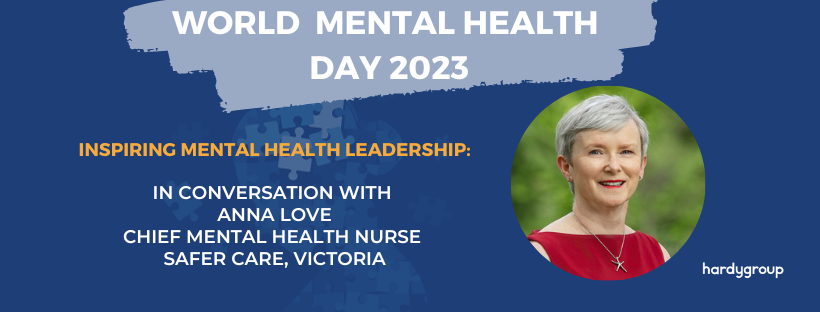Inspiring Mental Health Leadership
31 Oct 2023

In the spirit of World Mental Health Day 2023, we spoke to Anna Love, Chief Mental Health Nurse at Safer Care Victoria. Anna is passionate about mental health nursing clinical practice and leadership in Victoria, nationally and internationally.
- In the context of World Mental Health Day 2023, centred on individuals’ fundamental right to mental health and safeguarding the rights of others, how do you as a leader in the mental health sector champion this?
As Chief Mental Health Nurse for Victoria, a leader, and a proud mental health nurse, I feel strongly that everyone has the right to mental health. As a community, we need to ensure every individual is able to access mental health support and that they are aware of the various types of mental health support available.
Our society needs to advocate for mental health support and nurturing. We need to remove any stigma and self-stigma, and we can achieve this by educating society about mental health and wellbeing.
In my role as a mental health leader, I ensure that mental health is considered as part of all discussions, e.g. physical health. People living with a mental illness often have poor physical health and yet they receive less and lower quality healthcare than the rest of the population. In 2016, the National Mental Health Commission released the Equally Well Consensus Statement: Improving the physical health and wellbeing of people living with Mental Illness in Australia. It calls for better collaboration and coordination between governments, professional bodies, social and community services, and mental health leaders to make the physical health of people living with mental illness a national priority.
I am proud of the work I led in Victoria to provide our response to the consensus statement and a framework to guide our state’s mental health clinicians; equally well in Victoria: Physical health framework for specialist mental health services. This will ensure we can improve the physical health and wellbeing of all Victorians living with a mental illness.
- What strategies do you believe leaders should adopt to impact policies and behaviours, guaranteeing the preservation of this human right?
An organisation’s values should be reflective of mental health and wellbeing, and it is vital that all leaders are role models who demonstrate and encourage discussions around mental health and wellbeing.
Workplaces should be psychologically safe. It requires the building of a work culture in which staff feel that they can speak up without fear of reprimand or humiliation. It includes building and maintaining positive relationships between work colleagues.
Creating a healthy culture takes intention, time, patience, and commitment by leaders, and while we’re seeing more organisations focus on creating psychologically safe workplaces, there is still lots more we can achieve, particularly in advocating for diversity, equity and inclusion, which translates to people having a sense of belonging and inclusion, of being seen and valued.
Leaders also need to be vulnerable, open about how they manage their mental wellbeing. I talk openly about what I need to help maintain my wellbeing. For me, it’s the connection between my physical and mental wellbeing. I include exercise to my daily routine, and it’s built into my day. I enjoy walking, Pilates, weightlifting, and boxing. I also have a personal trainer and I love working and exercising with a group.
- The statistics reveal a significant increase in mental health problems among Australians in recent years. From your perspective, what has contributed to this trend, and how can leaders and organisations respond?
We need to improve our understanding of the growth in loneliness, and how loneliness can present in and affect individuals. As a society, we have become very isolated in the way we work but also in our social and home lives. It was worsened through COVID and continues through the constant development of new technology that draws us away from human interaction and towards online media.
Flexible workforce arrangements, allowing people to work from home and enabled some to work variable hours has led to an improved work/life balance but leaders and organisations should be careful to ensure they don’t exacerbate loneliness through flexible work arrangements. Allowing and encouraging teams to meet face to face can address some of these challenges and provides an opportunity for individuals to gain support, communicate personally and increase connections with others.
- In the mental health sector, leadership extends beyond the professional realm to personal. How can leaders inspire and mobilise their colleagues, peers, and communities to actively participate in initiatives that promote mental health rights and access to quality care for all?
Role modelling by leaders, demonstrating respectful communication, talking openly about mental health and wellbeing, and respectfully drawing attention to and discouraging discriminatory language is essential. Often people are unaware that they are being offensive and/or derogatory.
Leaders who connect with others are able to identify challenges and solutions. Leaders who are actively engaged with the mental health sector are likely to create dynamic responses to issues. This can result in opportunities for meaningful conversation and collaboration with the active participation of all parties to promote mutual respect and the ability to care for all.
There are a number of state and national days that leaders can embrace to promote mental health and wellbeing, e.g. RUOK, Mental Health Week, and Mental Health Nurses Day. More locally, leaders can develop activities to promote mental health and wellbeing, including random acts of kindness, pay it forward activities, and positive affirmations of the day or week. Encourage staff to share positive stories with peers. It’s how we inspire others.

